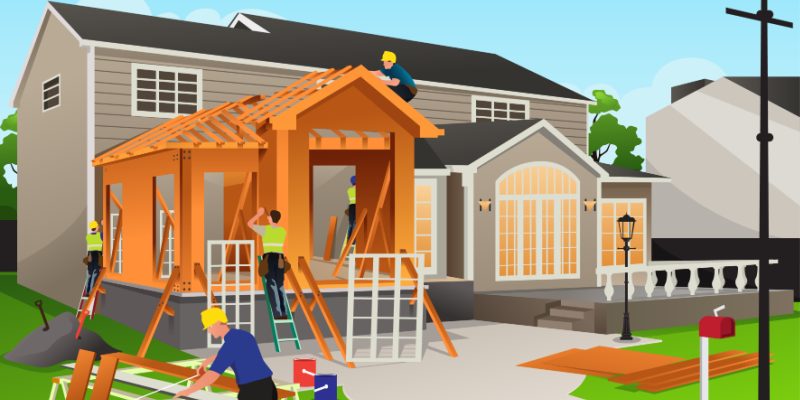By Maura Keller
Thanks in part to the ongoing pandemic, which is forcing people to spend more time in their homes these days, homeowners’ attention is turning to home renovation projects. In fact, the online home remodeling platform Houzz conducted a study that found a 58% annual increase in project leads for home professionals in June 2020.
Hiring an experienced and reliable contractor is crucial to a streamlined and successful home construction or renovation. But how do you know what to look for in a contractor, and what are some of the key questions that need to be asked when choosing a contractor?
According to Tom Miller, former president of the National Association of the Remodeling Industry, it’s important to start with the local contractor licensing board, which can be found by simply searching online for your state’s contractor licensing board website. (Wisconsin’s can be found on the Department of Professional and Safety Services website dsps.wi.gov.) You can see what kind of complaints may have been registered against a prospective contractor, and to make sure they carry the proper license, bond and insurance.
“If there are any complaints, check to see if they have been satisfactorily resolved,” Miller says. “And ask to speak to, or visit, a past client or two. Online review sites, which are fairly anonymous, have much potential to be unreliable.”
Nicki Hebgen, co-owner of Washa Remodeling & Design in Madison, says some common mistakes homeowners make when hiring a contractor is assuming the lowest bid is the best deal. That could mean lower-quality craftsmanship or something was missed — and you may have unforeseen overages later in your project.
“Make sure to get a signed contract from your contractor with an accurate scope of work. Make sure the contractor is licensed and insured and that they pull permits and do things the right way,” Hebgen says. “Just be sure to keep the line of communication with your contractor open — a good contractor will be there to answer all questions throughout your whole project.”
Also check to see if the contractor belongs to NARI, or a similar professional organization. NARI members sign a code of ethics and are committed to promoting professionalism in remodeling.
WHATTOASK
When interviewing potential contractors two key questions to ask are, what is your warranty and what does it cover? The industry average for a warranty is one year. More established contractors will warranty their work for as many as five years or more.
Regarding references, any contractor should provide the names of three (or more) homeowners that can provide useful, realistic feedback of their experience with said contractor. Also consider using the measurement tool called Guild Quality, a third-party survey firm who contacts clients after project completion for an in-depth, detailed survey/report about their remodeling experience.
In our virtual world it’s inevitable that you’ll still probably try to research a company online — but as Miller noted previously, you’ll need to do more than just that. Hebgen says how long a company has been in business and if they are making their customers happy is important, too.
THE PRICE IS RIGHT
According to Miller, professional contractors do not have time to provide estimates for every potential client who asks; typically, a phone interview can narrow the field for both homeowner and contractor, to see if the project and schedule appear to be a good fit for both parties.
“Many professionals are willing to make a first visit, to meet the homeowner and see the environment, and can often offer a rough estimate of price range based on what they see, but working up a reliable ‘scope of work’ and budget takes an investment of time and would typically involve a fee for services,” Miller says.
When the team at Washa Remodeling & Design price out a project, they provide an initial budget range based off a loose scope of work.
“If the customer decides to move forward with the preliminary agreement then we work toward final selections of materials and a detailed scope of work along with subcontractor walk- throughs,” Hebgen says. “With all that information we can produce a detailed, accurate proposal. All of this information is detailed out on the final scope of work contract for the customer.”
QUALITY CONTROL
Assuming you have thoroughly reviewed your contractor, talked with references and looked at many photos of their work, you should feel confident and excited to start your new project. Prior to starting, you hopefully have developed a relationship with the contractor and design team so that you feel the lines of communication are open.
The way Hebgen and her team communicate with clients has changed over the years. “With Zoom calls and email, we often can have the initial meeting and not even step foot into the customer’s home; however, the same trust that forms throughout the building or remodeling process remains the same,” Hebgen says. “Often friends are made and repeat customers are common.”
As such, you should be able to communicate with your contractor about any issues or questions. Hebgen suggests that if the company has a website, it may also be helpful during the vetting process to read the bios of the carpenters or the subcontractors, to see how many years of experience they have.
“A couple issues to look for in poor quality work would be carpenters showing up late, not taking proper worksite safety measures and not protecting completed work,” Hebgen says.
If you find yourself in this situation, you need to be upfront and see if your contractor can resolve the issue. With most contractors it’s usually a simple miscommunication or something that can be resolved.
During the construction process, Miller says it’s also important to pay attention to whether schedule disruptions are discussed openly. And is the site cleaned up and made orderly daily? Do the workers conduct themselves professionally? “These are signs that you’re dealing with a trustworthy professional,” Miller says.
Of course, all projects involve some degree of demolition or deconstruction and it is not uncommon to uncover some issue needing correction not covered in an agreement. Miller says that homeowners should expect some surprises, but it’s important to make sure there is a discussion about the process and cost of a solution.
“Expect some punch-list items to pop up, even several months after the project is done and you are living in it,” Miller says. “Materials dry out, things settle, cracks in caulk, grout or paint will appear. This is normal and a professional should come back to take care of them.”
And at any sign of a problem, make sure to deal with the issue promptly, in person and with an open mind. Miller says that if the issues continue to seem unresolvable, discuss with the contractor whether you can agree on discontinuing the project, knowing that you would have to pay for services rendered.
“Local licensing boards often have a complaint resolution process, where a third party works with both sides to reach a suitable compromise,” Miller says. “If the contractor simply will not deliver what was promised in the agreement, there is almost always a claim process that a homeowner can go through. But remember, if you choose a true professional, none of this will be necessary.”
KEY QUESTIONS TO ASK A CONTRACTOR
- How long have you been in business?
- Do you maintain a current license, bond and insurance?
- Do you belong to NARI or another professional trade association?
- Are there past clients I can check with, and can I see some of your similar work?
- What is the timeline for the project?
- What permits will be needed and will you obtain them?
- What is the price of the project and payment schedule?
- Who do I contact if I have questions?
- How are overages or change orders handled?
Finally, ask to see a sample contract from the contractor and have it reviewed by an attorney. Pay special attention to:
- Start and completion dates.
- How are payments made? A significant project should be paid through monthly draws based on percentage of completion with inspections and payout through a title company. This protects both the contractor and the owner.
- Insurance requirements and limits — the homeowner and contractor have to protect each other.
- How are changes to the scope of work handled? They should be based on real costs.
- What is the warranty period and how are warranty issues handled?




